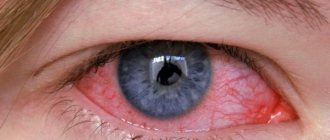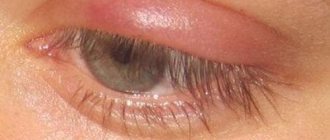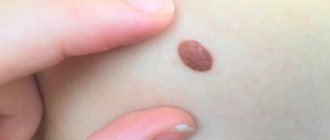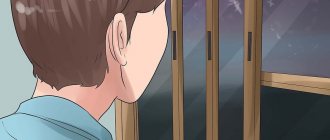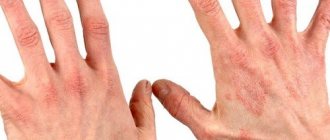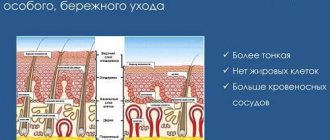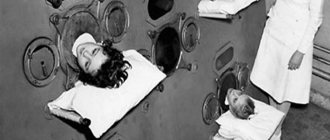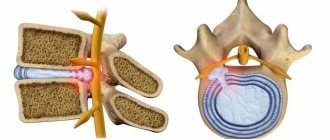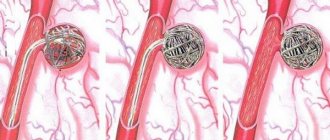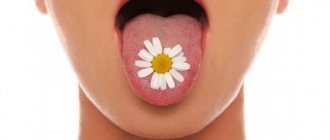Who is at risk?
It is worth understanding that a tic is a repeated involuntary muscle contraction that a person cannot control.
It can occur at any time and last several minutes. Children's doctors often face questions about why the left eye twitches. Young patients complain of this disease several times more often than adults. Muscle contractions are usually painless and do not affect vision in any way.
- primary tic, which begins due to disturbances in the functioning of the nervous system;
- a secondary tic that appears due to problems in the functioning of the brain or as a result of injury.
Only a qualified specialist can make an accurate diagnosis. Primary tic is the most common form of the disease. In this case, we need to look for an answer to the question of why the left eye twitches. It starts due to emotional instability. This problem is most common among children, adolescents and the elderly.
What are nervous tics?
Tics (or nerve tics) are rapid, repetitive, involuntary contractions of a group of muscles that result in either movement (motor tics) or sound (vocal or vocal tics). Most tics are mild, infrequent, and barely noticeable, but some can be frequent and severe.
Motor tics can affect any part of the body, but often affect the muscles of the face, eyes, head and neck, causing movements such as:
- facial twitching;
- grimaces;
- eye twitching;
- shrug.
Common vocal tics include:
- cough,
- grunting sounds.
Sometimes tics may seem similar to normal movements. However, tics are not voluntary and most people cannot consciously control them. Some people are able to suppress nervous tics for a short time, although this is similar to holding in a sneeze. The person feels increasing tension until the tic is finally released.
Folk signs
Many people are not inclined to see the problem in
around eyes. There are many folk beliefs that explain why the left eye twitches. The sign is as follows. If you start to experience twitching in your left eye, then you should expect trouble. People believe that this promises disappointments that will lead to tears.
If the left eye begins to twitch in a representative of the stronger sex, then romantic or financial turmoil awaits him. This also foreshadows a number of misfortunes that will affect the life principles of such a man.
But women should not be afraid. For them, a twitch of the left eye can promise profit or successful purchases.
Whether to believe folk superstitions is up to everyone to decide for themselves. But if your eye begins to twitch too often, or muscle contractions are so strong that others notice them, then it is better to consult a neurologist.
There is an opinion that a guardian angel is responsible for the right side of the human body, and a demon is responsible for the left. Therefore, twitching of the left eye portends tears due to upcoming problems.
The features and complexity of the upcoming troubles are determined by exactly where the tick is observed.
If the upper eyelid of the left eye twitches, financial difficulties, problems in business or personal life are possible.
If a woman’s upper left eyelid twitches, it’s time to make new purchases, they will definitely be of high quality
Sometimes a twitching upper left eyelid is associated with personal life and promises a quarrel or separation from a loved one, and possibly a fight. However, in some cases this same sign means something pleasant, a meeting, a date, communication with family.
If involuntary contractions are observed in the lower eyelid on the left, then troubles may be associated with scandals, threats to reputation and empty troubles.
For a young person, such a sign may mean a conflict with one of the parents regarding financial issues, possibly inheritance.
There is a belief that twitching of the corner of the left eye in an elderly person can foretell a change in weather, for example, rain or hail.
The interpretation of the sign differs depending on what day of the week the tick is felt.
| Day of the week | Meaning |
| Monday | Financial losses, negative news from loved ones. A woman is foreshadowed by tears, a long conflict, a showdown. Possible meaning for a man is the fight against an enemy or competitor in business |
| Tuesday | Someone close to you may get sick, and treatment will be long and expensive. In the worst case scenario, death is possible. For a female representative - possible betrayal of a partner |
| Wednesday | An unpleasant conversation, sad news about someone from your family. For a woman - tears, financial losses, collapsed plans. For a man - dismissal, loss of position, unpleasant conversation with superiors, incurring debts |
| Thursday | Deterioration of reputation, financial losses, empty troubles. A man can be promised trouble on the personal front, a woman - betrayal by a friend. For an elderly person - guests and bad news from them |
| Friday | Disappointment in your activities, empty expectations, unpleasant information that needs to be hidden from loved ones. For a woman - an illness, a difficult or unsuccessful trip |
| Saturday | For a man, it can mean news of betrayal. For a girl - possible tears, a quarrel with her parents. For a mature woman, it may mean the emergence of a rival or unpleasant news from children |
| Sunday | For a woman, disappointment in her partner, possible separation, and health problems may also appear. For a man - a joyful but emotionally difficult event, perhaps the birth of a child |
The interpretation also changes depending on the time of day.
| Day of the week | The meaning of the sign |
| Morning | The sign portends trouble. It is important to control yourself and try not to get involved in conflicts, watching your words. The belief also advises avoiding important meetings on this day, as they may not go well. |
| Dinner | Unpleasant news or guests. All that remains is to tune in to the event, since it is unlikely to be prevented. Perhaps you yourself will become the source of someone's troubles |
| Evening | Possible arrival of someone from afar. Another meaning is an unpleasant surprise. |
| Night | At night, the meaning of the sign is positive - it can mean good news |
There are several common sources of this pathology. Overexertion, lack of sleep, large amounts of coffee, alcohol, nicotine consumed, and dry eyes can provoke a condition in the body in which the eye twitches. Psychosomatics - the science of the relationship between the occurrence of diseases of the physical body and the negative psycho-emotional state of the patient - has its own point of view on the formation of this disorder. When becoming familiar with the metaphysical causes of this disorder, one should pay attention to the importance of the side of the body where the disease or deviation arose.
The left side in psychosomatics is responsible for the feminine principle and is associated with care, the ability to receive, ask for help, obey, and provide for others. Due to the fact that the left side is supervised by the right hemisphere of the brain, it is characterized by the following skills: listen and trust your own intuition; demonstrate aesthetic, imaginative, creative talents. It is also associated with home and the inner world of wisdom and introspection.
To better understand the causes of spontaneous twitching of the upper or lower eyelid, it is necessary to familiarize yourself with the interpretation of this pathology by world researchers of the psychosomatics of diseases.
Louise Hay
| Pathologies and disorders in the body | Possible origin | Affirmations |
| Eye twitching, tick | Fear. The feeling that someone is watching you. | I am accepted by life in general. Everything goes well. I'm safe. |
| Eyes | They symbolize the ability to clearly see the past, present, and future. | I look with love and joy. |
| Left side of the body | It is a symbol of receptivity, absorption, feminine energy, woman, mother. | I have a wonderful balance of feminine energy. |
Luule Viilma
The famous doctor came to the conclusion that the psychosomatics of the left eye twitching is associated with the presence of shyness and self-pity in the patient. And paralysis of the eye muscles occurs, according to the author, due to the suffering of the patient’s mother and women of his family.
Liz Burbo
This Canadian psychologist claims that tics are characteristic of patients who have restrained themselves for a long time and have reached their limit of patience. This deviation indicates that the victim may lose control of himself at any moment. He wants to throw out his anxieties, sorrows, and fears, but he restrains himself because he does not want to lose face in the eyes of others.
Valery Sinelnikov
The Russian writer and doctor explains that this disorder is quite common in children. One of the sources of this pathology is the lack of unconditional love among parents for their child. They have a sense of duty, but no love. Rike Hamer
The psychosomatic sources of vex tremor from the point of view of the “New German Medicine” in the person of its author, Dr. Rijk Hamer, are associated with the manifestation in the consciousness or subconscious of the affected conflict “you can’t close your eyes,” real and fictitious, manifested in the inability or unwillingness to close your eyes during implementation Biological Special Program for the muscles of the eyelid.
The revolutionary methodology of our time in the field of alternative healing of diseases and radical solutions to problems is “Spiritual Integration”. This is the proprietary technology of Konstantin Dovlatov, a successful and sought-after psychologist and coach of our time. The skills of this technique are incomparable.
Having mastered them, the student has direct access to dialogue with his own soul. With the help of the skills of “Spiritual Integration”, you will easily find the true reasons why your left eye twitches, the psychosomatics of the pathology. At the same time, you will not need specialist consultation or a lot of work to find the sources of the disease in the works of psychosomatics researchers.
Your soul, and only yours, in a matter of minutes, and most importantly, will accurately indicate the true sources of deviation. It will give you the opportunity to independently and quickly eliminate psychosomatic sources of pathology. A big “plus” in training will be the fact that it is possible to master the skills of the system both live and remotely – through online training.
- Finely grate five grams of valerian root. Pour a glass of boiling water over the resulting raw material. Let it brew for a couple of hours. Dilute thirty milliliters of infusion in one hundred and fifty milliliters of water. Drink no more than three cups of the drink during the day.
- Some healers recommend applying a copper wire to the solar plexus during an attack. They claim that soon the eyelid will stop twitching.
- Pour two tablespoons of centaury into two glasses of boiling water. Let it brew overnight. Divide the resulting infusion into four parts. Take thirty minutes before meals.
Important symptoms
Experts say that there are two types
In a simple case, the muscle contracts once; in a complex case, a prolonged or double spasm is observed.
At the same time, the person cannot figure out why the eye (left) is twitching. It is better to find out what to do in this case together with your doctor.
If a patient has these tics only once or repeats them very rarely, then he is unlikely to go to the doctor. As a rule, people turn to specialists for whom eyelid twitching causes severe discomfort or for whom it occurs too often. In some cases, they are very pronounced: even from the side it is noticeable how the eyelid twitches, the eye may squint.
Involuntary twitching of small muscles near the eye can be observed in every person.
A minor nervous tic is usually not focused on, but it also happens that this problem does not go away for several days or recurs periodically.
This disease cannot be left without attention, since its cause can be either simple psycho-emotional overload or serious disruptions in the functioning of the central nervous system.
Involuntary contraction of small muscles can be observed in almost any part of the human body, but most often they bother the area around the eyes.
This is associated with anatomical features near the orbital region:
- A large number of nerve endings and muscles on the skin of the face;
- The weakest muscles are in the near orbital zone;
- A person's face is directly related to the expression of basic emotions.
Both adults and children suffer from nervous tics. If this disease is permanent and interferes with a normal lifestyle, then you need to consult a doctor to find out the causes and ways to eliminate the problem.
Nervous tics, to some extent, can be a symptom of VSD and osteochondrosis, since nearby nerve endings are involved in this process.
It happens that it can provoke insomnia in the early stages of pregnancy. More details...
Several factors can lead to involuntary twitching of the muscles under the eye, the main ones being:
- Banal eye strain associated with working on a computer, reading books with small print.
- Disturbance in the functioning of the nervous system. These reasons can be caused by injuries, atherosclerosis, or previous meningitis.
- Nervous tics in children develop after suffering a birth trauma or suffocation during childbirth.
- Mental disorders - depression, neuroses.
- Lack of basic groups of microelements in the body.
- Drug therapy with drugs from certain pharmaceutical groups.
- Hereditary predisposition. Nervous tics in different areas of the body can be recorded in blood relatives. Moreover, in some family members this can be expressed by twitching of the eye muscles, in others by obsessive movements.
- In children or adults with an unstable psyche, severe fright can provoke a nervous tic of the eye. In childhood, tics can also be caused by helminths.
Some doctors associate the appearance of a tic near the eye with dysfunction of the liver - the nerve endings of the organ are connected precisely to this area on the face.
Symptoms
Signs of a nervous eye tic are especially noticeable to others. Muscle twitching begins unexpectedly for a person; at the initial stage, they can be suppressed by an effort of will, but in the end they will still appear after a short period of time.
In some people, a tic occurs at the moment of greatest physical or psycho-emotional stress, in others, on the contrary, during rest.
It often happens that close attention from people around can trigger an attack, which is especially typical in childhood.
In children
Nervous eye tics in a child in most cases occur in preschool age; doctors attribute this to the fact that at this age the child’s psyche is being formed and any psycho-emotional trauma can negatively affect the state of the nervous system.
A peculiarity of the course of a nervous tic in children is that the child himself does not pay attention to his condition, may consider this to be the norm, and if parents or others do not focus on this fact and do not begin to wonder how to stop a nervous tic, then the baby will will not feel vulnerable.
Nervous tics during pregnancy are also not a rare phenomenon, since the expectant mother is still worried about her situation. They are characterized by slight nervousness, which is associated with concern about the safe bearing of the child.
To relieve nervous eye tics, mothers need to try to calm down, rest more and walk in the fresh air.
Nervous tic of the eye can last from several seconds, minutes and up to several days. The duration of the attack depends on the state of the nervous system; taking medications recommended by the doctor and using his recommendations will significantly reduce the time of involuntary twitching.
The disease does not affect other systems of the body, does not reduce a person’s performance and intellectual potential, but can significantly reduce self-esteem due to the negative attitude of others.
This happens especially often in adolescence, when the formation of personality and character largely depends on the opinions of peers.
Diagnostics
The diagnosis is made based on visual identification of muscle twitching. Since a nervous tic can signal problems in other systems of the body, it is necessary to conduct a comprehensive examination.
The main research methods include encephalography of the brain, ultrasound of internal organs, especially the liver, and detailed blood tests with the determination of trace elements.
Children with tics are recommended to be tested for helminths.
Based on the data from the tests performed, the doctor prescribes treatment. In most cases, eliminating the underlying cause also leads to a decrease or complete disappearance of muscle twitching.
Neuropathic pain is known to be a very unpleasant phenomenon.
Advice
You can read what anti-stress pills are used to treat it in this article.
Diagnosis of tics
How to determine why a muscle twitches in a particular place in the human body, and what is the reason for this manifestation? First of all, you need to consult a neurologist to make a correct diagnosis and prescribe effective treatment.
Comprehensive diagnostics includes:
- neurological examination of the patient,
- anamnesis collection,
- blood chemistry,
- general blood analysis,
- encephalography of the brain,
- X-ray of the brain,
- CT scan,
- Magnetic resonance imaging,
- consultation of third-party specialists (psychiatrist, traumatologist, oncologist).
The list of studies listed above is not complete and in some cases the doctor has the right to prescribe additional diagnostic measures to complete the picture.
Meaning for women and men
The meaning of the sign may differ depending on the gender of the person. So, for women, eye twitching on the left side can mean the following:
- quite serious problems that will haunt you over the next week;
- disagreements with colleagues that can interfere with career advancement;
- waste, loss of money, possibly theft or bad investments;
- conflicts with relatives with grievances and claims, and, most likely, both sides will be wrong.
Sometimes the eye twitches as a result of certain diseases of the nervous system
. If the left eye twitches in men, the interpretation of the sign may be as follows:
- health problems;
- a thief or an ill-wisher, perhaps a competitor, may break into your home;
- unexpected dismissal from work without reason;
- financial losses;
- receiving bad news about your relatives;
- business problems that can cause loss of money and failure of profitable deals;
- a significant meeting that may have negative consequences;
- failures in personal life, cooling in relationships or their breakup, sexual problems;
- loss of valuables;
- a fight is possible.
Diagnostics
Tics are diagnosed by describing symptoms and observing them. Special tests are usually not required to diagnose tics.
Sometimes an electroencephalogram (EEG) may be recommended to rule out convulsions (fits) as the cause of tic movements. An EEG is a painless procedure that records the electrical messages sent by the brain.
Upper eyelid tic causes – Eye treatment
Louise Hay
Luule Viilma
Liz Burbo
Valery Sinelnikov
Very often, eye twitching begins in children aged 5-8 years. During this period, their psyche is very vulnerable. The eye may begin to twitch when there is a quarrel in the family or when there is too much stress at school. Due to constant loneliness, accumulated resentment, and misunderstanding, a chronic form of tic may develop.
But the answer to the question of why the left eye constantly twitches lies not only in emotional instability. This may be a sign of birth trauma, oxygen deprivation, bruises in the nose and eyes. Sometimes the cause of secondary tics is infectious diseases or tumors.
Experts also highlight a hereditary factor. If eye twitching is passed on from generation to generation, then we are talking about disturbances in the functioning of the central nervous system. This form is quite rare.
09.09.2018
A condition such as a nervous tic, when a person's eye (lower eyelid) twitches, has different causes, and treatment may vary. Occurs in people of different ages and different genders. The vast majority of people whose eyelids twitch suffer from increased neuro-emotional stress.
There are a number of reasons why the muscle under the left or right eye twitches:
- Strong psycho-emotional stress: unfavorable family environment, conflicts at work, overwork and stress.
- Increased load on the organ of vision: reading in moving vehicles, in low light, prolonged work at the computer, long visual concentration on small objects.
- Lifestyle disorders. Drinking large amounts of coffee, alcohol, energy drinks, lack of sleep, and lack of B vitamins in the diet lead to a disorder of the nervous system, and the eyelid begins to twitch.
- Ophthalmological diseases and mechanical damage to the eyelids. They manifest themselves as redness, swelling of the eyelids, and a feeling of sand in the eyes. After a few days, the person notices that his lower eyelid is twitching. This occurs due to concomitant muscle damage.
- A nervous tic under the eye can be caused by causes related to cerebral circulation disorders (ischemia, thrombosis, vascular atherosclerosis, brain injury, tumors), or damage to the facial nerve. A neurologist treats these pathologies.
- The eye may begin to twitch after recent colds, often recurrent chronic infections, or allergic conditions.
- Sometimes a twitching eye is inherited from parents who have the disease.
When your eye is twitching, rule out what could be causing the tic. Often this is enough for the symptom to go away.
You notice that you have frequent or constant twitching under your eye. What do we have to do? First, find out the cause and rule it out. Normalize your rest, stop drinking energy drinks and coffee, learn to control negative emotions. This will help not only to relieve nervous twitching, but also calm the nervous system as a whole.
A nervous tic is a neurological symptom that can be either the result of ordinary fatigue and overexertion, or a manifestation of a disease. Usually the lower eyelid is involved in the process, but in some cases the upper eyelid or both may twitch.
Single manifestations of this type usually do not cause concern in people, but constant repetitions of twitching of the lower eyelid force them to consult a doctor or traditional medicine. Without identifying the cause of a nervous tic, it will not be possible to completely eliminate this symptom.
Causes
The following causes of twitching of the lower eyelid are distinguished:
- Nervous exhaustion;
- Tired eyes. But how to use eye drops for fatigue and redness can be seen here;
- Atherosclerosis;
- Diseases of the nervous system;
- Alcohol, coffee, energy drinks;
- Poor nutrition;
- Allergy;
- Brain injuries. But this information will help you understand how to properly use pain-relieving eye drops after welding.
Sometimes tics can be not only in the eyelid area, but also spread to the facial part - nose, cheeks, lips, and so on, involving in the process the muscles of the face or those responsible for speech. It is worth understanding that this pathology is often the result of a serious disease such as damage to the central nervous system or oncology.
Without preliminary diagnosis, it will not be possible to identify and treat the causes of lower eyelid tic. Often, against a background of stress, central nervous system pathologies develop, which provoke the symptom. Self-medication only stops the main manifestations and gives the disease a chance to develop.
Treatment
Treatment of tic of the lower eyelid can be carried out either with single drugs or agents, or in combination. An integrated approach is the most effective. Intended use:
- Therapeutic techniques;
- Medicines;
- Physiotherapy; Physiotherapy is used along with medications
- Folk remedies. But this article will help you understand how chorioretinitis is treated with folk remedies.
Such complex therapy will allow you to quickly relieve symptoms. But it is worth considering that without diagnosis and identifying the true cause of a nervous tic, it will not be possible to completely eliminate the symptom, and the condition itself will only be relieved.
Only a doctor can prescribe a complete comprehensive treatment based on the existing symptoms and diagnostic data. Rarely does anyone manage to cope with the problem on their own, and only in the mildest cases.
It will also be useful for you to learn about how to use Ujala eye drops and what diseases they can help with.
Therapeutic techniques mean normalization of lifestyle. This includes:
- Doing exercises;
- Normalization of activity during the working day;
- Avoiding stress;
- Normalization of rest;
- Diet correction;
- Eliminating from the diet a number of foods that can stimulate the nervous system or cause disturbances in its functioning.
Normalization of activity during daylight hours implies a decrease in loads for people with high activity and an increase for those with a sedentary lifestyle. At the same time, it is necessary to normalize the rest regime. In this case, we mean not only sleep, but also leisure, that is, the time that a person should allocate to himself and his needs every day.
Often, even with a normal number of hours of sleep, many suffer from nervous tics due to the fact that they cannot find time for themselves: going to the hairdresser at the spa or just watching a movie.
You may also be interested in learning about how and in what cases Artelac Splash eye drops are used.
Many people have difficulty avoiding stress, since it is usually associated with work or family. Therefore, it is especially important to begin to gradually change your life.
In extreme cases, in situations where it is not possible to change the lifestyle, doctors prescribe courses of sedative and sedative medications.
It is especially important to pay attention to your diet.
In this case, we mean a lack of certain micro- and macroelements, which are required not only by the body as a whole, but also by the central nervous system in particular. The nervous system needs B vitamins and minerals of various types to the greatest extent.
Vitamins A and E are also important. Vitamin C improves and strengthens the blood supply system, and this in turn allows you to fully nourish nerve tissue. But how nervous eye tics are treated in adults can be seen here.
Products such as coffee, strong black tea, alcohol and energy drinks overload the nervous system. With prolonged and heavy intake of these drinks, the functioning of the central nervous system is often disrupted, which leads to the development of various negative symptoms. In addition, they generally have a negative effect on the body, and therefore can significantly worsen a person’s condition.
Drug treatment is usually used in cases where specific help is already required, and other methods have not helped.
Before prescribing certain drugs, the general clinical picture is revealed and it is determined whether the nervous tic of the lower eyelid was caused by diseases.
Next, usually either general treatment is prescribed for the found disease, or a weak sedative and nootropics, which will help stabilize and strengthen the central nervous system.
Such drugs include:
- Novopassit; Good drops for calming nerves
- Piracetam;
- Glycine;
- Tinctures of motherwort, valerian, peony, hawthorn. A set of the best natural soothing remedies
In especially severe cases, doctors may prescribe botulinum toxin injections. It perfectly relaxes the muscle fibers, which involve involuntary movement of the lower eyelid. But what to do if the lower eyelid twitches, and what can be done about such a problem, is indicated here.
Many medications have their own contraindications and side effects. If used incorrectly, they can worsen a person’s condition and intensify existing symptoms. Therefore, before use, read the instructions and consult your doctor.
But how eye drops are used for glaucoma and what the list is can be seen here.
Physiotherapy
Physiotherapy is an excellent assistant in the fight against nervous tics and simply physical and emotional stress. In case of illness, as well as simply a preventive course, you can take:
- Electrophoresis; One of the most effective treatment methods
- Massage. But this information will help you understand how massage occurs for dacryocystitis of newborns according to Komarovsky.
- Acupuncture.
The last two are the best remedies against nervous tics and overexertion in general. That is why most people involved in high positions turn to reflexologists for help. Given the many variations of these procedures, you can use different techniques and determine the one that helps best.
Before contacting a specialist, make sure of his professionalism. It's a good idea to look through reviews and recommendations, and also ask people you know for advice on the best reflexologist they've used. An unqualified specialist can, through incorrect actions, worsen the patient’s condition.
Causes of tics
The exact cause of nervous tics is unknown. Tics often run in families, with multiple family members affected. Tics are believed to be a hereditary condition, possibly with a genetic cause.
Defective gene
It is possible that a faulty gene is responsible for a person developing a tic. Research is trying to determine if this is true.
Stimulant medicine
Some types of stimulant medications used to treat certain conditions, such as attention deficit hyperactivity disorder (ADHD), can cause tics. These nervous tics usually stop when the stimulant medications are stopped.
Tourette's syndrome
As with other types of tics, the cause of Tourette's syndrome is not fully understood.
Although the cause of Tourette's syndrome is unknown, current research points to abnormalities in certain areas of the brain (including the basal ganglia, frontal lobe, and cortex), the circuits that connect these areas, and the neurotransmitters (dopamine, serotonin, and norepinephrine) responsible for communication between nerve cells. .
Head injury
In very rare cases, tics can be caused by a head injury.
Correcting the situation
If you periodically experience involuntary contractions of the eye muscles, and therefore you are constantly looking for an answer to the question of why your left eye often twitches, then you should reconsider your lifestyle. These problems often appear in people who do not take care of their health.
Constant stress, sitting for many hours in front of the TV or computer, lack of sleep can cause disturbances in the functioning of the nervous system. Also, problems often appear in those who abuse caffeine, alcohol and smoke a lot. We should not forget that a deficiency of certain vitamins (for example, group B) and microelements (magnesium) can cause the development of a neurotic state.
Nervous tic of the eye - causes, symptoms, treatment methods
First of all, the doctor should try to find the answer to the question of why the left eye twitches. If this is a primary tic, then therapy will consist of revising your lifestyle, changing your diet, taking sedatives and a complex of vitamins. So, a specialist can prescribe a chamomile decoction,
or motherwort. In addition, doctors advise to significantly reduce the amount of coffee and strong tea consumed. In nutrition, it is recommended to focus on
These include legumes, chocolate, bananas and fish.
But in some situations, such an adjustment does not give the desired results. In these cases, it is necessary to conduct a detailed health examination. Thus, frequent twitching may indicate increased intracranial pressure. This also indicates that an inflammatory process begins in the tissues of the eye.
A nervous tic is an involuntary contraction of muscles, and no person is immune from such a disorder, even if he can boast of perfect health.
Despite the fact that such a symptom usually does not foretell anything terrible, it can indicate disorders in some body systems, so if your eye twitches and the symptom is permanent, you should consult a specialist.
Nervous eye tic
Nervous tics in general in medicine are designated by the term “hyperkinesis,” but in ophthalmology such a disorder is more appropriately called “blepharospasm” (short-term rapid twitching of the lower or upper eyelid of the eye).
Blepharospasm in the eye occurs due to the fact that among the many nerve endings on the face, those that are concentrated in the eye area are the most “gentle” and respond to stimuli in the form of nerve impulses faster and earlier.
09.09.2018
Eyelid twitching (myokymia) is a serial involuntary contraction of the orbicularis oculi muscle. Medicine refers to such muscle contractions as hyperkinesis, and the popular name for this phenomenon is nervous tic.
The reasons why involuntary twitching of the upper or lower eyelid may occur can be different, but in most cases it is a disorder of the nervous system due to an experience or stress.
In very rare cases, this phenomenon can cause pain. Especially if the eyelid twitches over a fairly long period of time. Due to constantly occurring contractions, the eye muscles become overstrained, tired, and subsequently each twitch becomes painful.
There are several reasons that can lead to involuntary eye twitching. Let's look at some of them:
- Stressful conditions. People react to stress differently. So, some people make scandals and scream, others have hysterics, and still others develop a nervous tic. In this case, it is possible to stop twitching by eliminating the cause of the stress itself and restoring calm.
- Severe eye strain. Such tension occurs when constantly using a computer, watching TV, or wearing vision correction products (glasses or contact lenses) for a long time.
- General eye fatigue. May be associated with sleep disturbances.
- Dry eyes. This phenomenon is more often observed in older people. At a young age, this condition develops with prolonged work at the computer. In this case, the person constantly looks at the monitor and blinks less often. This is where dry eyes can occur.
- CNS lesions. In this case, neuro-reflex excitability increases, muscle tone decreases, which leads to short-term cramps of the upper or lower eyelid and muscle hypertension.
- Previous infectious diseases (influenza, ARVI, otitis media, conjunctivitis, blepharitis) can cause inflammation of the orbicularis muscle of the eyelid.
- Heredity. Sometimes there is a genetic predisposition to the development of a nervous tic.
- Chronic nervous diseases that are associated with dysfunction of brain activity (Parkinson's disease, Tourette's syndrome, Bell's palsy).
- Uncontrolled consumption of strong coffee and alcohol. Often, frequent consumption of these drinks can lead to the appearance of a nervous tic.
- Unbalanced diet. A lack of vitamins and microelements (magnesium, potassium, calcium) necessary for normal functioning in the body can lead to uncontrollable twitching of the lower or upper eyelid.
Naturally, this is not a complete list of possible reasons that can cause involuntary twitching of the eyelid.
If you discover this phenomenon in yourself, which does not go away for a long time, you should consult a doctor. A specialist will help determine the cause of eyelid twitching and give recommendations on how to eliminate this uncomfortable phenomenon.
